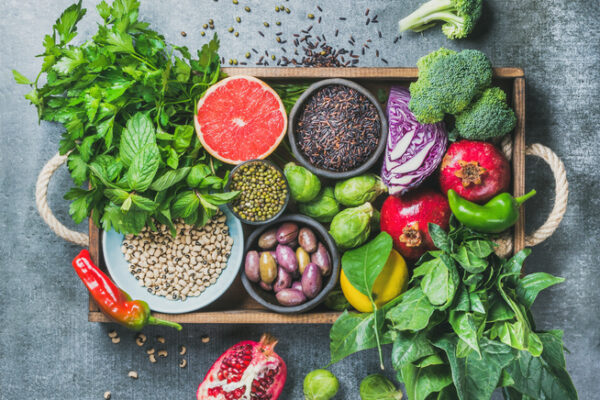What’s the Deal with Intermittent Fasting?

I talk a lot about food and diets on this blog. Today’s topic is a little different, as we focus more on the benefits of not eating rather than what we eat. Have you ever experimented with intermittent fasting or fasting of any kind?
The closest I would say I’ve come was a 10-day Juice Feast that I did back in 2008. For ten days, I drank 4 litres of vegetable juice every day. This is not the same as fasting, but it’s the most restricted I’d ever been. I did not enjoy it at all. Though I had planned on going two weeks, on the day that I gave in and binged on a jar of almond butter, I vowed to never put myself through anything like that again. In hindsight and ten years into this field, I can see so many things I did wrong during that juice fast that likely would have made it easier, and more effective.
Intermittent fasting is a whole other bag of marbles, so let’s discuss.
What Is Intermittent Fasting?
Intermittent fasting is going without food for a certain period of time. Fasting cycles vary – some involve fasting for anywhere from 16-24 hours, and eating is restricted to a certain window – from 12pm to 8pm, 11am to 7pm, etc. Other approaches recommend eating normally for 5 days and severely restricting calories on other two. This is known as the 5:2 diet.
Intermittent fasting (IF) is different from caloric restriction (CR), which also provides a similar slate of health benefits and shows promise in animal models at extending our lifespan. With caloric restriction, you’re simply eating fewer calories in a day. Intermittent fasting is often called an ‘eating pattern’ because it is more about timing and when you eat. The specific timing of intermittent fasting helps instigate certain hormonal processes that benefit our health.
Health Benefits of Intermittent Fasting
Some the health benefits of intermittent fasting include:
Weight Loss
Studies on intermittent fasting indicate that it can result in weight loss, fat reduction and an improved metabolism, along with improving insulin resistance, which can play a vital role in obesity as well as overall health. It sends our bodies into ketosis, which can enhance weight loss and also offers a host of additional benefits. When you’re going without food for a certain period of time, you may naturally reduce caloric intake. However, people often find it easier to follow IF diets because they don’t involve constantly eating less at every meal, so they are more likely to stick with it. Fasting periods also reduce late-night snacking which so many of us fall prey to.
Circadian Rhythm
Proponents of intermittent fasting note that creating a regular routine and specific timing around food helps us to regulate our circadian rhythm. It can help us tap into our innate biological rhythm, leading to the proper release of hormones in the right amount, such as insulin and growth hormones. This can lead to a reduced risk of diabetes, improve our metabolism, and help us maintain a healthy weight.
Cardiovascular Health
IF can help reduce some cardiovascular risk factors such as triglycerides, blood pressure and cholesterol, as well as levels of C-reactive protein, a marker of inflammation.
Digestion
Fasting can positively impact the microbiome (our colony of gut bacteria that is essential to good digestion, mood and immunity), as well as strengthen our intestinal barrier and help support the gut’s natural circadian rhythm. As a culture, we have a habit of constantly eating and snacking – and this puts constant pressure on our digestive tract. A period of fasting helps our bodies complete their digestive processes and gives us a rest, especially in the evening when metabolism may be slower.
Insulin Resistance + Diabetes
Studies show that IF can help improve insulin resistance, enhance beta cells and can be an effective eating pattern for those who have diabetes. And IF can help with weight loss – one of the major risk factors for diabetes.
Cancer
IF has been studied for its anti-cancer effects, as it can limit the signaling pathways that can lead to cancer. It can also lower the systemic inflammation associated with cancer risk, inhibit tumor growth, and even enhance the effects of cancer treatments.
Inflammation
Studies indicate that IF can reduce C-reactive protein levels, one of the important indicators of inflammation. It can also lower pro-inflammatory cytokines and immune cells, as well as prevent oxidative stress that can eventually lead to inflammation.
Athletic Performance
Intermittent fasting enhances human growth hormones that can help us burn fat and build muscle. Some evidence indicates that IF can help athletes improve body composition and their overall health.
Brain Health + Anti-Aging
Researchers have looked into the effects of IF on brain health and found that it can help limit oxidative stress that leads to brain aging and protects the nervous system, as well as help prevent neurological diseases like Alzheimer’s and Parkinson’s.
Drawbacks of Intermittent Fasting
Some things to be aware of if you’re interested in trying intermittent fasting.
- It’s hard: While some people find IF easier than constant caloric restriction, that doesn’t mean it’s easy. You really need to be a conscious eater and resist the urge to eat, even though you may feel hungry.
- There aren’t a lot of dietary rules: Intermittent fasters are encouraged to eat a healthy diet, but there aren’t specific rules about what’s best. That means that any food could be included, and some ingredients or foods aren’t the best choices.
- Binge eating: Prolonged restriction may lead to overeating or eating junk foods.
- Emotional factors: IF can be tough emotionally and socially. It can also be a trigger for people with disordered eating patterns.
- Hormonal factors: If you suffer from any kind of hormonal imbalance, fasting could be fuel to that imbalanced fire and cause a worsening of symptoms. Some say it’s actually worsening before it gets better, but that alone could be a deterrent.
I always recommend working with a qualified health practitioner if you’re going to fast intermittently. This ensures you are meeting your nutritional needs and are fasting safely.
Would I Try Intermittent Fast?
No. I like to eat. That’s not actually the full reason, but a big part of it. I always strive for balance, when it comes to choosing the diet and lifestyle that works for me. This isn’t the same as “all things in moderation”, but more that I want the way I live and eat to be something I can maintain ongoing. Similar to my feelings on the ketogenic diet, I would try this if all signs pointed to it being indicated. That being said, I’d like to think that my diet and lifestyle choices that I make every day, help to rule out a lot of the common health circumstances that do indicate benefits of intermittent fasting.
And for now, as long as I’m nursing, this is obviously out of the question.

Free Resource Library
Enjoy more than 40 downloadable guides, recipes, and resources.
























I am a big fan of intermittent fasting! I have experienced all the benefits you listed above and I guess because I eat clean, and have a healthy relationship with food, I haven’t experienced the drawbacks. When I learned about IF it just seemed to make sense without all the science backing it. (Although I appreciate that part too.) Never, during the evolution of our species – until about 50 years ago – did we have access to the amount of food we have today. So for me skipping one meal was not that hard to wrap my head around. Then, I learned that with my body, I can feel bloated and gassy (TMI) when I eat regularly during the day (even clean food). Since IF – I barely… well…have gas, like ever. The other benefits are – it’s free, convenient and simple to do with any diet whether you’re Paleo, Keto, Vegan, Gaps, etc. or none-of-the-above! I really like the FREE part though, especially since eating clean monthly costs more than my mortgage. But, like every way of eating, or not eating, it’s not for everyone!
I really appreciate this factual, tangible, honest, and nonjudgmental explanation of this way of eating. From some practitioners, you get that this a horrible approach that makes no sense for anyone – yet, there IS research pointing to some benefits, especially in the aging well realm. But, it’s also not the panacea it’s sometimes touted as, and, as you mentioned, can be very challenging emotionally and socially and can be a real trigger with those with disordered eating histories or current behaviors. Some practitioners wouldn’t even touch on those pieces and they’re such an important part of eating and why and what we eat. So, thank you! Really appreciate the balanced approach.
Informative article on IF. Overall if an individual does their research and approaches it practically, they will succeed. Our caveman ancestors certainly did not have 3 square meals a day and they survived. For me personally, my food addictions are gone and my digestion problems are a lot better. I am actually more “regular” now than when I never missed a meal. It helps to write it all down, keep track of what you ate, and make sure you do not miss out on any important nutrients. I even sleep better. Share what you are doing with others to stay accountable. I feel so much better now and it taught me I can be strong and the benefits are totally worth it.
I have been interested on IF for a while now but in my research I found out it is different and more complicated on women as IF interferes with your hormones (as you mentioned in the article). But it’s interesting to note that this only happens for women apparently. I have been advised that if we want to go on IF we need to do it just a couple of days a week and not more that that.
Always a wealth of information here. So glad I found you! I’m asking this question thought I’m pretty sure of the answer. Yet I’m hoping I’m wrong: if I drink tea with milk, am I still fasting? Ha! I would love for you to say “yes.”
I understand that dairy milk is a no-no for IF. What about coconut milk creamer for coffee?